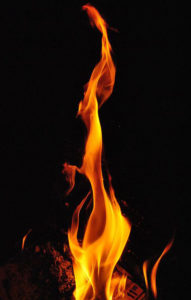
In this passage, we witness the author of Acts as he attempts to describe an incredible and miraculous spiritual experience which is not easily articulated.
Acts 2:1-21
2:1 When the day of Pentecost had come, they were all together in one place.
2:2 And suddenly from heaven there came a sound like the rush of a violent wind, and it filled the entire house where they were sitting.
2:3 Divided tongues, as of fire, appeared among them, and a tongue rested on each of them.
2:4 All of them were filled with the Holy Spirit and began to speak in other languages, as the Spirit gave them ability.
The idea that the Holy Spirit appears as a wind is probably related to the Hebrew word “ruach,” which can mean various things including: “wind,” “spirit,” “divine force,” “an inspiration from God,” or “the spirit of holiness.” For a more extensive interfaith view on that topic, click here. For ideas about how we present that idea to our Sunday School kids, click here.
But, as most Christians know, the “tongues, as of fire,” that “rested on each of them” is also a powerful and important piece of the narrative. Many have pointed out that Acts 2:3 is reminiscent of Matthew 3:11 when John the Baptist mentions the relationship between Jesus, the Holy Spirit, and fire.
“I baptize you with water for repentance, but one who is more powerful than I is coming after me; I am not worthy to carry his sandals. He will baptize you with the Holy Spirit and fire.”
Two faith traditions that offer passages related to these ideas are Islam and Hinduism.
Islam
Many people know that Jesus/Isa is considered a prophet in the Islamic tradition. Less well known is the idea that Jesus/Isa is specifically mentioned, more than once, as the prophet on whom the Holy Spirit rested.
Qur’an 2 (The Cow):87 (Shakir translation)
And most certainly We gave Musa [Moses] the Book and We sent messengers after him one after another; and We gave Isa [Jesus], the son of Marium [Mary], clear arguments and strengthened him with the holy spirit. What! whenever then a messenger came to you with that which your souls did not desire, you were insolent so you called some liars and some you slew.
This next passage is also interesting because it refers to some Jesus miracles (speaking as an infant and breathing life into a clay bird) that exist in the Islamic narrative but not in the traditional Christian one. Interestingly, the clay bird incident also appears in the gnostic text, The Infancy Gospel of Thomas. Anyway, here is the passage.
Qur’an 2 (The Cow):253a (Pickthall translation)
Of those messengers, some of whom We have caused to excel others, and of whom there are some unto whom Allah spake, while some of them He exalted (above others) in degree; and We gave Jesus, son of Mary, clear proofs (of Allah’s Sovereignty) and We supported him with the holy Spirit.
Finally, there is a verse in the Qur’an that speaks to the Holy Spirit as the messenger of revelation.
Qur’an 16 (The Bees):102 (Arberry translation)
The Holy Spirit sent it down from thy Lord in truth, and to confirm those who believe, and to be a guidance and good tidings to those who surrender.
Hinduism
The Bhagavad Gita relates to today’s lectionary passage in a slightly different way. The Bhagavad Gita is a 700-verse excerpt from the great Indian epic, the Mahabarata. It is also, primarily, a conversation between Prince Arjuna and Lord Krishna. In this particular chapter, Lord Krishna is trying to explain that Absolute Reality is the essence of all things created and the source of all things created, while also transcending all things created. To get at this, Lord Krishna rests, in part, on the five great elements: earth, air, fire, water, and void.
Bhagavad Gita 7:8-9 (from Srimad Bhagavad Gita)
O Arjuna, I am the sweetness of flavor in water; the radiant luster of the sun and the moon; the primordial root symbol Om within all the Vedas; the subsonic element of sound in ether and the ability in man. I am the original fragrance in the earth, the heat in fire and the vitality of all beings; also I am tolerance in those who perform austerities.
Since translations of the ancient Sanskrit often vary widely, here’s another version of this same passage.
Bhagavad Gita 7:8-9 (Easwaran translation)
Arjuna, I am the taste of pure water and the radiance of the sun and moon. I am the sacred word and the sound heard in air, and the courage of human beings. I am the sweet fragrance in the earth and the radiance of fire; I am the life in every creature and the striving of the spiritual aspirant.
From time immemorial, humans have struggled to articulate that which can’t be articulated. It is therefore somewhat interesting, perhaps, that various faith traditions often look to Nature for assistance, using both wind and fire to express the inexpressible.
Multifaith Mashup provides passages from the writings/sacred texts of other faith traditions that match an excerpt from the Biblical lections offered in the Revised Common Lectionary. Multifaith Mashup is published on Tuesdays and focuses on the lectionary readings for the upcoming Sunday. Questions? Contact us at vicki@worldreligions4kids.com.